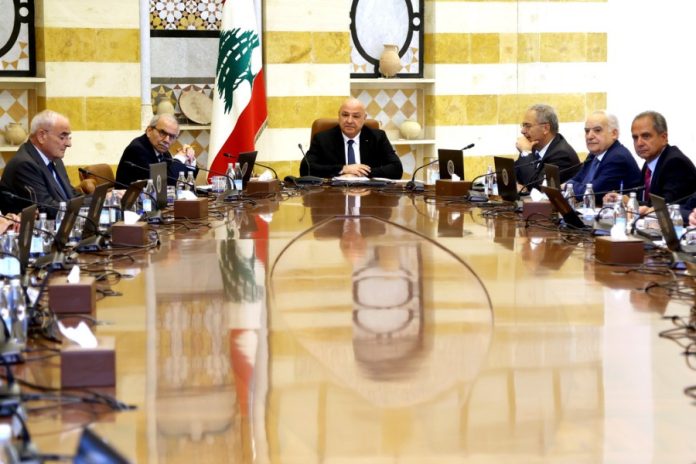
Last week, the Lebanese government made a historic move toward restoring full authority over its territory by committing to disarm all groups possessing heavy weapons — most notably Hezbollah.
For more than four decades, Hezbollah has wielded both military and political power in Lebanon, undermining the country’s independence and destabilizing the region. Now, for the first time in years, the Lebanese state is acting to assert its sovereignty and assert control nationwide — a move unimaginable just a year ago, when the militia’s grip on the country seemed unshakable.
A devastating Israeli bombing campaign in Lebanon and Iran during the past year, followed by the loss of its most important ally with the fall of the Assad regime in Syria, dealt a devastating blow to Hezbollah’s infrastructure and military arsenal. However, the group, which continues to benefit from Iran’s support, retains some influence domestically, despite its isolation. Until it lays down its weapons, it remains a threat to the country and, indeed, to the region’s stability.
The U.S. envoy to Syria and current U.S. ambassador to Turkey, Tom Barrack, recently put forth, after several rounds of talks in Beirut, a multi-phase plan to end the military escalation that has persisted between Hezbollah and Israel since the November 2024 ceasefire was signed by Israel and Lebanon.
Lebanon’s Prime Minister Nawaf Salam and President Joseph Aoun recognized that without decisive action to support the U.S. proposal to dismantle Hezbollah’s arsenal once and for all, the Trump administration and its allies would reconsider future diplomatic and financial support to their war-torn, bankrupt nation. Parliament Speaker Nabih Berri, who represents a large Shiite population in Lebanon, also acknowledged the importance of this pivotal moment when the government took its bold decision on Aug. 7 to fully disarm Hezbollah by the end of 2025.
The decree is a first step — and the most difficult work lies ahead. Following its passage, Hezbollah’s leadership vowed never to give up their arms and threatened a return to military action. All that to say, that the dangers are real, not just in the abstract but in immediate, practical terms. Just days after the announcement, six Lebanese Army soldiers were killed while dismantling a Hezbollah bomb factory.
Lebanon must now appreciate that it has the most to lose if implementation falters, and it cannot afford to fall short of its obligations under this agreement. Following through on its commitments will ensure the obligations of other countries involved — including Israel, the United States, France, Qatar and Saudi Arabia. This is a historic opportunity for Lebanon to break free from the grip of non-state militias and restore the state’s monopoly over arms. But success will depend on all parties honoring their commitments.
Under the U.S. plan, Israel is to cease all ground, air and maritime military operations following the Lebanon government’s decree, ensuring that the government can begin implementing a disarmament plan. It is expected that within 120 days, all militias will be neutralized and Israeli forces withdrawn from Lebanese territory. The U.S., France, Qatar and Saudi Arabia have, in turn, pledged to strengthen the Lebanese Armed Forces’ ability to enforce the agreement and protect the country’s sovereignty, as well as to organize an international economic conference to spur Lebanon’s recovery and reconstruction.
The U.S. and its allies should establish mechanisms to enforce the agreement’s implementation. Such oversight would be welcomed by the Lebanese people, who are eager to see an end to the cycle of violence and corruption. Washington can also send a strong signal of confidence by prioritizing funding for the Lebanese Armed Forces to carry out its mission — assistance already endorsed by both the Trump and Biden administrations, as well as Congress — if Lebanon were to take decisive action as it did last week.
France, Qatar and Saudi Arabia are likewise encouraged to work alongside others in strengthening the Lebanese Armed Forces and consider advancing the timeline of their proposed donor economic conference, if the parties are fulfilling terms of the agreement on time.
By launching this process, Lebanon’s leaders have sent a clear message to their citizens and to the world: They are committed to national unity, the rule of law and regional stability. The international community should stand with Lebanon at this turning point — offering sustained diplomatic engagement, enforcement, financial assistance and security backing — to ensure follow-through on both security commitments and advancing reforms that strengthen institutions and accelerate reconstruction efforts.
Peace between Lebanon and Israel is within reach, but only if all parties do their part.
Edward Gabriel is the former U.S. ambassador to Morocco, 1997-2001, and president of the American Task Force on Lebanon.

